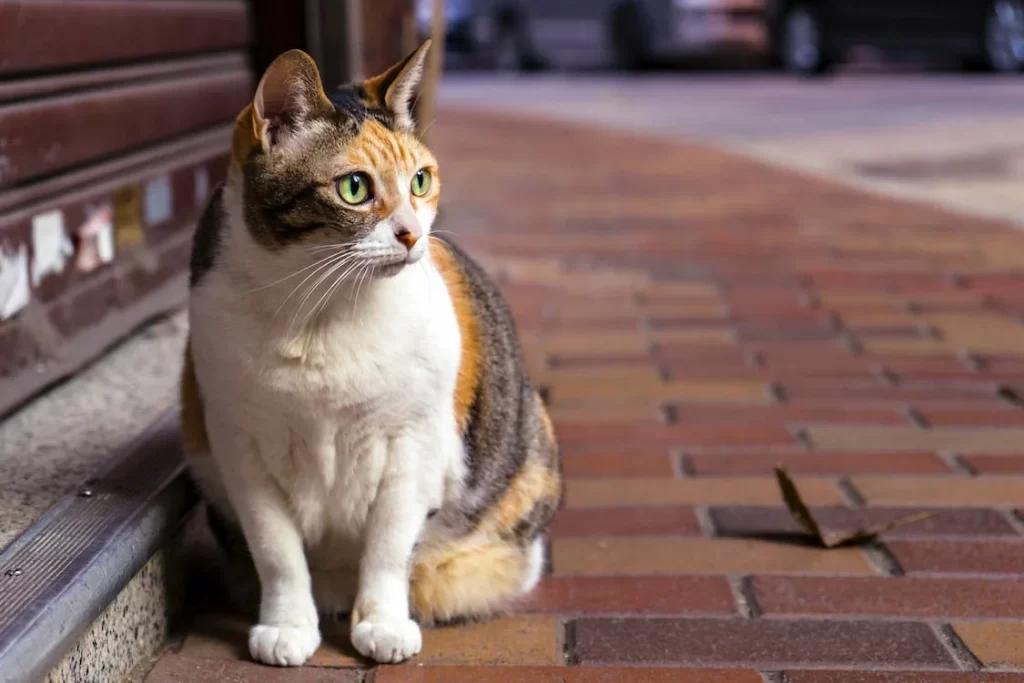
Have you ever wondered if your cats will run away to die? In most cases, felines do not go missing with the intent of killing themselves. While some creatures may seek a pleasant spot to die, this is not usually the case with domestic cats. Because of their strong attachment to their owners, cats are more likely to die in the company of those they love than to venture off into the unknown.
On the contrary, if a cat’s health has been gradually deteriorating due to age-related issues like kidney failure or cancer, she is more likely to stay nearby where her owner can care for her until it is time for her quiet exit from life.
There have been reports of domestic cats disappearing, leading to their deaths, but this is likely due to factors other than a desire for privacy. These cats may have been startled outside, lost their bearings, or curious about the world beyond their front door. A housecat that wanders off without food, water, or shelter may die of starvation within a few weeks, but it’s more likely that the cat had been briefly removed from the home base before dying.
Additionally, most animal shelters are aware of the natural dying process and offer dignified euthanasia services for those who are no longer able to care for themselves; therefore, unless the situation is extremely dire, you shouldn’t have to worry about your pet wandering far to avoid the agony pain associated with terminal illnesses or physical disabilities. Instead of jumping to the worst possible conclusion, it is better to consider all possible causes of a disappearance.
What Can Make A Cat Flee Home?
- Fear
If a cat is scared, it may run away in an attempt to escape whatever or whoever is causing them fear. This could be another animal, such as a dog or even a human, if they are not used to people, and their presence makes the cats feel threatened. Cats also flee when loud noises scare them, like fireworks or thunderstorms.
- Unfamiliar Surroundings
A change of environment might make your cat feel uncomfortable enough that it wants to leave its current home for something more familiar and comforting elsewhere; for example, if you have recently moved into a house, then this can cause anxiety for cats which leads them to run off back into where it was once considered ‘home’ before the move happened; whether this new location still holds, safety remains unknown thus creating uncertainty within feline mindsets leading some pet owners having difficulty retrieving these runaway pets afterward.
- Overpopulation/Lack of Resources in the Home
Excessive numbers of animals living together at one time have been known to push cats beyond breaking point regarding patience levels towards other occupants residing inside the same premises. Overcrowding often results in quarrelsome attitudes among felines forcing some individuals to make escape attempts and ultimately find solace further afar until tensions cool down.
- Territorial disputes
Occupied and constrained space disputes between fellow occupants cannot always be avoided, just like any other species. Territorial disputes have become typical, necessitating extra vigilance to prevent flare-ups from growing and to avoid regrettable situations with family members fleeing for refuge outside perimeter boundaries. The owner should protect the well-being of everyone involved avoiding stressful confrontations from arising because certain parties try to impose themselves upon others through dominance and superiority.
- Seek Personal Freedom.
It is common to find domesticated kitties wanting to explore their world rather than remaining cooped indoors, relying on human companions to provide sustenance, meals, and entertainment throughout the day. Older matured specimens fancy exercising freedom by roaming around the neighborhood, enjoying sights and smells associated with the natural terrain. They discover different locations gained by access to areas inaccessible, for instance, climbing trees or exploring rooftops. Due to unfamiliarity with the surrounding settings, there is an increased likelihood of getting lost, injured, or danger lurking nearby, such as dangerous predators or cruel weather conditions.
What To Do If Your Cat Runs Away
Unfortunately, the chances of a pet cat returning after it runs away are slim. However, some steps can be taken to increase those odds:
- Contact your local animal shelters and humane societies to notify them about the missing cat and provide a description of your pet (including any distinguishing features or markings). Ask if they have seen or received reports from anyone who has spotted your lost kitty.
- Check all nearby parks, yards, and alleys at least twice daily – during morning hours and night time too – because cats tend to hide more often than not during daylight hours so look carefully under porches, etc., even peeking into sheds and garages just in case, not forget calling out his name while searching.
- Leave food outside by feeding dishes placed strategically throughout the area where she was last seen so that if she is roaming somewhere close by, this might entice her back home eventually.
How To Prevent Cats From Running Away
- Keep your cats indoors or in a secure outdoor enclosure
Allowing them to roam freely outdoors can lead them into dangerous situations, so keeping them inside is the best way to ensure their safety and prevent them from running away.
- Create an inviting home environment for your cats
Cats need stimulation and playtime just like any other pet; ensuring they have plenty of toys and activities will help keep boredom at bay which could cause restlessness that leads to straying outside of the house boundaries!
- Make sure you provide regular vet checkups.
Regular veterinarian trips are essential to prevent cats run away to die, as health issues may be causing anxiety or discomfort, leading to up-and-coming escape events before they occur.
- Train with rewards instead of punishments
Making training fun by providing positive reinforcement such as treats rather than punishing bad behaviors helps create trust between owner and kitty; this will also encourage proper obedience even if there’s temptation around every corner, like open doors.
- Microchip your pet
A microchip implanted in your cat’s neck effectively tracks its whereabouts if they go missing. This will also help ensure you get them back safely and securely. Make sure you keep their information up-to-date with the microchip registry as well.
Signs Of Aging Or Sick Cat That Wants To Leave Home
- Changes in Appetite
A cat that is aging or ill may experience a change in its appetite. This could be eating less than normal or more than usual if they have difficulty digesting food properly due to illness or aging. If their dietary needs aren’t being met at home, this can cause them to feel restless and want to leave in search of better sustenance elsewhere.
- Hiding away from people
When cats age or get sick, they often become skittish around people as their senses begin dulling down with time, making loud noises startling for them and unfamiliar faces intimidating, causing them stress which causes an urge to flee from the environment where these perceived threats arise from home.
- Not grooming properly
Cats usually take great care of themselves by grooming regularly. Still, when something’s not right health-wise, you might find that their kitty isn’t putting much effort into its appearance anymore, leading to feeling uncomfortable living amongst humans who don’t understand why it looks disheveled all the time, thus wanting out of such an alienating situation.
- Excessive vocalization
When cats are in pain or distressed, they tend to vocalize more than usual. This can be difficult for owners to handle as it disrupts their home environment, prompting the cats run away to escape from such a noisy abode.
What Are The Signs Of A Dying Cat?
- Loss of Appetite
A dying cat may lose their appetite and stop eating or drinking altogether, leading to dehydration and further health complications if left untreated.
- Lethargy
Cats nearing the end often become more sluggish than usual, sleeping longer with no interest in playing or interacting with people or other animals around them.
- Changes in Grooming Habits
As cats age, they tend to groom themselves less frequently; however, a sudden decrease usually indicates something is wrong, such as illness or pain due to injury. Also, excessive grooming could indicate stressor anxiety-related issues like behavioral problems caused by environmental changes.
- Vomiting
Suppose your cat begins repeatedly vomiting without any known cause. In that case, you must take them straight away and see a vet as soon as possible. This could indicate an underlying condition requiring immediate treatment before it worsens, leading to death eventually.
- Weaknesses
You should notice your pet becoming weak when walking, jumping stairs taking corners, suddenly faltering, collapsing signs failing strength advice, visit a veterinarian checkup, diagnose the situation, and determine an appropriate course of action to save the life of your precious companion animal.
Do Cats Choose A Place To Die?
Cats rarely choose a specific location to die. Cats are more likely to locate a comfortable, quiet area where they can die gently and with dignity. Cats are inherently solitary creatures who prefer to be alone when it comes time to rest or relax, so if your cat has a favorite spot in the house or even outside near some preferred bushes or trees, it may become their final resting place when death approaches.
When a cat is diagnosed with a terminal disease, many will seek out dark corners and crevices throughout the house, such as closets, basements, and attics, where they can feel secluded and safe from potential intruders, including other pets. They may seek soft bedding items such as blankets or rugs to lie comfortably without feeling too exposed; this could explain why we frequently find our deceased feline friends nestled between furniture pieces behind cabinets.
In addition to searching out warm locations in your home while ill, older felines may seek shelter outside during warmer weather months since outside provides them with consistent access to fresh air rather than having only one small window open at any given time within. Outside investigations by senior cats tend to move toward isolated regions surrounded by vegetation, which gives both comfort (thanks to the shade) and protection from larger animals. Finally, each pet has varied preferences on how and where he wishes to spend his final moments alive.
Conclusion
Cats are independent creatures and tend to wander off when they don’t feel well, but it is unlikely that cats run away to die. Although cats may hide or find quiet places for rest and comfort if feeling ill, their instinctual drive for survival usually leads them back home, where familiar surroundings provide safety and security. In addition, since most pet owners know the needs of their animals very well – from food requirements to litter box preferences – leaving these necessities behind would be counterintuitive, even during times of distress.
Therefore, while there may be cases where an elderly cat has ventured out one last time before passing away peacefully on its terms (or perhaps been taken by predators), running away as a means to end life does not appear likely considering how deeply ingrained those instincts can become over many years with loving caretakers. Thus, we must remember that our feline friends remain loyal companions with individual personalities throughout their lives; regardless if they stay close by or venture far away, they always give us unconditional love until the very end.


